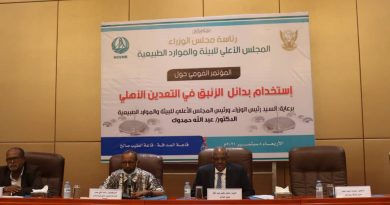ENVIRONMENTAL AND SOCIAL SAFEGUARDS CONSULTANT
Introduction:
The Higher Council for Environment and Natural Resources (HCENR) has received a grant from the GCF through the UNDP to implement a Project titled: “Building resilience in the face of climate change within traditional rain fed agricultural and pastoral systems in Sudan”. The project serves 9 states of Sudan, namely West, Central and East Darfur, West and South Kordofan, Red Sea, Kassala, Northern and Khartoum states.
The project aims at building resilience of subsistence farmer and pastoral communities and physical assets and livelihoods to climate change risks, by mainstreaming a number of farming practices, such as seed selection, water management, pest management, forestry management, and pasture and livestock management and improved livelihood support systems.
The project will enhance resilience by climate-proofing current productive activities through the introduction of new management schemes and technologies. Many of the interventions are targeted towards public goods – communal rangelands for livestock grazing, village-level water supply, and decentralized irrigation systems – while other interventions aim to increase the adaptive capacity of households that are most vulnerable to climate change by introducing drought-resistant seed varieties, forest/fruit tree nurseries, vegetable gardens for women-headed households, and livestock nutrition and disease prevention programmes.
Moreover, the enhanced capacity of the state-level administration in areas of environmental governance, management of shared natural resources, inter- and intra-state relations and how to establish a network of early warning systems will help prevent conflicts and out-migration in the targeted areas. Specifically, the project addresses three major strategic elements as follows:
· Resilience of food production systems and food insecure communities improved in the face of climate change in Sudan, benefiting at least 200,000 households and farmer and pastoralist with at least 35% women.
· Improved access of water for human, livestock and irrigation to sustain livelihoods in the face of climatic risks in the nine targeted states benefiting at least 200,000 households.
· Strengthened capacities and knowledge of institutions and communities on climate change resilience and adaptation.
II. The environmental and social objectives of the project is to:
Ø Increase the productivity of livelihoods and the populations’ capacity to adapt to climate change through various tested interventions in a coordinated manner to effectively address the challenges facing the rural populations of Sudan.
Ø Encourage good management practices through planning, commitment and continuous improvement of environmental practices.
Ø Improve the water supply in the targeted areas and introduce water conservation measures.
Ø Land regeneration and soil conservation.
Ø Improve farming practices to increase productivity and resilience including irrigation, improved seed supply, improved animal husbandry practices and diversification of crops.
Ø Minimise or prevent the pollution of land, air and water pollution.
Ø Protect native flora, fauna and important ecosystems.
Ø Comply with applicable laws, regulations and standards for the protection of the environment.
Ø Adopt the best practicable means available to prevent or minimise environmental impacts.
Ø Describe monitoring procedures required to identify impacts on the environment, and
Ø Provide an overview of the obligations of GoS and UNDP staff and contractors in regard to environmental obligations.
III. Objectives and Scope of the ESS:
· The UNDP SES and GCF ESS should be applied to all phases of the project,
· The Social and Environment Standard 2019 (SES) are UNDP policies and requires that all Projects implemented through HCENR to maximize social and environmental opportunities and benefits as well as ensures that adverse social and environmental risks and impacts are avoided, minimized, mitigated and managed.
· The SES set out specific Standards related to social and environmental issues at each stage of project management cycle, HCENR\UNDP projects should meet these standards are listed as follows:
– Standard 1: Biodiversity Conservation and Sustainable Natural Resource Management
– Standard 2: Climate Change and Disaster Risks
– Standard 3: Community Health, Safety and Security
– Standard 4: Cultural Heritage
– Standard 5: Displacement and Resettlement
– Standard 6: Indigenous Peoples
– Standard 7: Labour and Working Conditions Standard 8: Pollution Prevention and Resource Efficiency
IV. Scope of Work: The consultant should work closely to implement this work with two assistants from HCENR and focal points in the 9 targeted states in close consultations with the BRCC Project Managers in the states, and the Agricultural and Water Consultants:
1. Undertake a detailed study of the project activities to elucidate the adherence to of the BRCC project to the SES standards mentioned in section III above.
2. The study should establish clear procedures and methodologies for screening, reviewing and managing environmental and social issues.
3. The study should point to any existing or potential risks and description of any mitigation measures that should be taken by the BRCC for avoiding adverse environmental and social impacts.
4. The study should Specify institutional arrangements, including roles and responsibilities for managing, reporting and monitoring social concerns.
5. Support the development and review of social instruments, checklists, guidelines and tools relevant to the implementation of environmental and social safeguards
V. Qualification and Experience:
1. B. Sc. Degree in social or environmental sciences or a related field.
2. Proven experience in undertaking social and environmental safeguards in development projects, preferably in climate change-based projects.
3. Experience in development/management of community engagement activities as well as in depth knowledge of participatory community engagement methodologies.
4. Practical experience in implementing Social and environmental safeguards standards for the UNDP or other international development agencies.
5. Excellent communication and reporting skills.
6. The ability to work as part of a team and travel in hard conditions.
VI. Duration:
– The duration of this consultancy is 60 days spread over 4 months (January, February, March, April 2023).
VII. Application Procedure:
Qualified and interested candidates are hereby requested to apply. The application should contain the following:
· An application letter that briefly describes the interest and why the individual considers him/herself as the most suitable for the assignment;
· Personal CV (max 5 pages) of the Applicant indicating his/her education background, professional qualifications, all past experience from similar projects, as well as the contact details (email and telephone number) of professional references;
· Applicants should submit application letter together with curriculum vitae (including current address and contact number), copies (only) of relevant certificates and be able to provide any supporting documents as may be required.
· Completed applications and supporting documents should be submitted to:
The office of the Secretary General of HCENR
Mekk Nimir Street – Khartoum P.O Box 10488 or by email to: hcenr2005@yahoo.com , CC: faisalelhag@hotmail.com
· Dead line: 17th December 2022 at 2.00 pm



